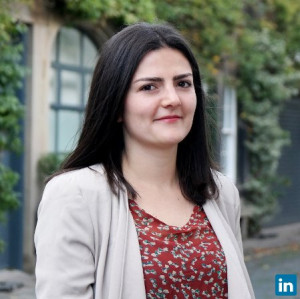Hello! I was wondering if there are any tips for mental calculations when doing multiplications with big numbers. I find that this is taking the most of my time and I think I dont have a good method.
Tips to do big multiplications in my mind

Most people struggle with big numbers with a lot of zeroes. Here's how I teach my students and I've gotten great results w/ it.
The thing to remember is: 1000 = K, 1000,000 = M, and ... so on for "B"). Now,
K * K = M, M*K = B, B/M=K, B/K=M. Take a minute to absorb this.
Next, do some practise. What is 2million divided by 10 thousand? That's 2M/10K = 0.2 * (M/K) = 0.2K == 200.
Do another one: what is 80B divided by 40K? 80/40 = 2, and B/K = M, so 2Million.
It gets easier: do the following in your head:
- 90,000 / 4500
- 8M/2K
- 100B/25K
- 2M*2.5K
and so on.. of course, things aren't as easy for fractions, etc but most errors happen due to these trailing zeroes and this method takes care of that.

Hi,
Basically, you need to develop 3 calculation skills:
1) Learn how to multiply double digit numbers (google fast math tips or The Veda math).
2) Learn how to work with zeros. Best way - always use 10^power instead of zeros
Example:
300x9000 = 3*10ˆ2 x 9*10ˆ3=3x9*10ˆ(2+3)=27*10ˆ5
Handwritten it looks not that complicated. If you get used to writing all the numbers that way, you will never loose zeros and all multiplications/divisions will be replaced with + or -.
3) Use math tools (Mimir math for iOS, Math tool on Viktor Cheng website) to practice. Train, train, and train again
PS, Additionally I suggest to learn how to make the division mentally:
4) Learn the division table up to 1/11 (i.e. 5/6 = 83.3%). It will help you calculate any percentage problems
Good luck!

Hi Anonymous,
my advice here: do NOT do such calculations in your head during an interview! You will not get ANY bonus points for this! The only two things that count are
(1) You are consistently correct in your math
(2) You can be easily followed
For this, do WRITTEN calculations. When properly done, it barely takes more time. But it is a much clearer way of communicating - and this is what is much much more important than speed! Doing math in your head is absolutely not client friendly: the interviewer will assume that this is how you will also act with clients. If the client can not follow you (because you are doing math in your head and are not being explicit with it, it is your fault!
That being said - it is certainly not harmful to practice such multiplications tables. But in the interview, please do the math properly in WRITTEN form!
Cheer, Sidi

Sure, always use 10^power instead of zeros
Example:
300x9000 = 3*10ˆ2 x 9*10ˆ3=3x9*10ˆ(2+3)=27*10ˆ5
Handwritten it looks not that complicated. If you get used to writing all the numbers that way, you will never loose zeros and all multiplications/divisions will be replaced with + or -.
Good luck!
How I would do the examples you provided:
24*45 = 10*45*2 + 4*45 = 900+180=1080
63*18 = 63*20-(63*2)=1260-126=1,134
91*22=90*22 +1*22 =90*20+90*2 +22 = 1800+180+22=2,002
In general, I try break up numbers into smaller segments that are easier to manage. It also depends if it's easier to subtract (as I did in the second example above) or just add up the various segments (as I did in example 1).
In general, just a lot of practice with this will get you a lot better and enable you to solve questions like this in your head in a short amount of time - but I would still write it out in an interview to be 100% sure!

Hi there,
Depends on what you mean by big numbers: Multiplications with a lot of zeros or just multiplications with some digits.
Starting by with a lot of zeros:
1) The obvious one: Taking the zeros out - doing the math - adding zeros in the end.
2) Working with letters instead of the actual zeros (i.e. client revenues are 100,000€ = 100k€) and knowing how they relate (i.e. k x k = M)
3) The most common mistake is for people to miss on the actual number of zeros - the easiest way to solve this problem is to (at the end) quickly round the numbers and see if makes sense (i.e. 12,433 x 1.78B = 22,130B lets say you instead of saying the correct number miss on a zero by mistake, just multiply 10,000 by 2B and you clearly see that it would be around 22,000 and never 2,200)
Regarding the second point with several digits
1) there are several ways to work it, trying to memorize multiplication tables, shortcuts - but for big ones I wouldnt worry much - from my experience with cases those are very rare, most of math is rather simple actually.
2) https://managementconsulted.com/mental-math-consulting/ This is a good tool for you to learn some quick ideas and to actually learn how to talk through your math which can be even better.
My 2cents

Hi Natalia,
I think Vlad and Nuno made some great comments in terms of how to work / practice mental math. Adding to what they said, I've found success when I teach people to break down big numbers to smaller components and using the distributive property to solve the problems.
Take 888 * 20 as an example. In this case, I would write it as (800+80+8)*20 which then becomes (800*20)+(80*20)+(8*20). With the latter result, you can work the math much easier and then simply add the components you have in order to come up with the answer more quickly (this is a simplified example but give the approach a try with different number and you'll see that it helps). The key here is identifying which number to break-down in order to make the math easier.
Hope this helps! Feel free to reach out if you have any other questions.
Best,
Carlos

Hi,
I use the following method and recommend it to all of my students:
https://www.youtube.com/watch?v=6ndkkPZYJHo
You can learn to do it on paper fast in 1-2 hours, and it will take couple of days to train doing it mentally.
Other useful tools:
1) Learn how to work with zeros. Best way - always use 10^power instead of zeros
Example:
300x9000 = 3*10ˆ2 x 9*10ˆ3=3x9*10ˆ(2+3)=27*10ˆ5
Handwritten it looks not that complicated. If you get used to writing all the numbers that way, you will never loose zeros and all multiplications/divisions will be replaced with + or -.
2) Learn the division table up to 1/11 (i.e. 5/6 = 83.3%). It will help you calculate any percentage problems
Best

Hi Anonym,
you may have a look at this video:
https://www.youtube.com/watch?v=6ndkkPZYJHo
best regards


















